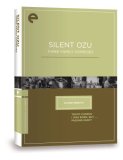| Reviews & Columns |
|
Reviews DVD TV on DVD Blu-ray 4K UHD International DVDs In Theaters Reviews by Studio Video Games Features Collector Series DVDs Easter Egg Database Interviews DVD Talk Radio Feature Articles Columns Anime Talk DVD Savant Horror DVDs The M.O.D. Squad Art House HD Talk Silent DVD
|
DVD Talk Forum |
|
|
| Resources |
|
DVD Price Search Customer Service #'s RCE Info Links |
|
Columns
|
|
|
Silent Ozu: Three Family Comedies - Eclipse Series 10
THE MOVIES:
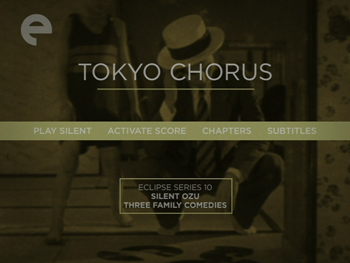
The Eclipse Series is the Criterion Collection's way of bundling specific segments of a director's career under one banner. Usually focusing on the less well-known pieces of a filmmaker's oeuvre, the Eclipse boxes come without any bells or whistles, presenting the movies on their own without extras or the meticulous restoration that is usually applied to their more high-end releases. Those kinds of DVDs take a long time to produce, and by taking this approach, the company can take films from the back of the line and get them to the public faster. Thus, the three movies in Silent Ozu - Eclipse Series 10, further subtitled Three Family Comedies, don't have to sit on a shelf waiting for Yasujiro Ozu's more venerated films to work their way through the system and clear up space for them.
Ozu already has his own Eclipse box, and is actually the first director to be a repeat in the collection. Late Ozu was the third in the series, and it showed the director at the end of his long career, making his final films in the '50s and '60s. Silent Ozu swings us back to the other end, presenting three of the Japanese master's early films from the 1930s. Though Ozu had actually begun working in the previous decade, the '30s saw him settling into the type of work that would define his career: films about family and their everyday lives, how they get by and how they deal with the rapidly changing onset of modernity while still keeping the core of family intact. He was already working with screenwriter Kogo Noda, his lifelong collaborator, to achieve a balance of tender humor and poignant drama, establishing a sense of calm sentimentality that would give even his heavier pictures a feeling of being free from Earthly gravity.
Those were all lessons that would serve him well once Ozu transitioned into talkies, but which began forming here, in the silent era.
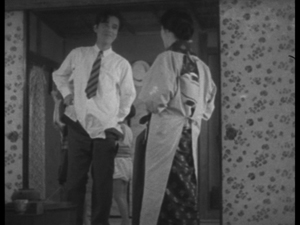
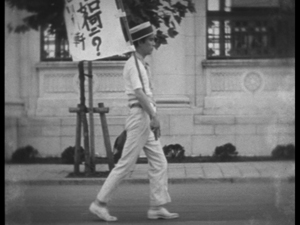
* Tokyo Chorus (Tokyo no korasu) (90 minutes - 1931): Four years into filmmaking and Ozu made his twenty-second picture, a bittersweet light drama about a struggling family in Tokyo. Though I realize this boxed set is billed as "Three Family Comedies," this is more a comedy as far as its lightness of tone than it is a laugh-out-loud effort. It's more the traditional theatrical definition of comedy, working in opposition to tragedy. In other words, everything turns out all right.
You could actually say that the comedy comes from the foolhardy ego of Shinji Okajima (Tokihiko Okada) needing to be deflated in order for him to grow up. Beginning in his school years, Okajima is the class cut-up making life difficult for his teacher, Omura (Tatsuo Saito). Underneath the antics, though, Ozu is introducing his larger themes of poverty and social standing. Much of Okajima's joking is covering up for the fact that he is not as well-off as his fellow students, his uniform is not up to snuff.
Cut to post graduation, and Okajima is now a family man with three children and a caring wife (Emiko Yaguma). He works for an insurance company and is getting on fine in his daily life, but as we will see, he is still caught somewhere between his idealistic youth and his real responsibilities. Hence, when his son (Hideo Sugawara) begs for a bike, Daddy promises the boy one to be a good guy and cool father; when the older office worker (Takeshi Sakamoto) gets fired from his firm, Okajima stands up for him, showing his coworkers that he has the mettle to oppose injustice. This only gets him fired, as well, and the rest of Tokyo Chorus is spent watching Okajima learn how to navigate his new station in life. Ozu adopts a realistic, socially critical eye to view Okajima's struggle, showing the poverty and employment on the city streets. Okajima is still left-of-center as far as this social commentary is concerned: he's still the clown from the early scenes, the happy dad from a family drama. Part of his new education, which is once again aided by teacher Omura, is to get more in line with reality, to drop the act and the pretense of pride, and face life with a clear vision. Ironically, what he will discover is that by growing up and accepting adulthood, he is once again free to enjoy himself.
In some sense, in the way Ozu peeks in on the children at play and juxtaposes it against the more serious adult concerns, I am reminded of his later family comedy Good Morning. In a larger sense, however, Tokyo Chorus shows the early groundwork for what would become the classic Ozu dynamic: a portrait of a family, a struggle between generations in the face of change, and a soft tone that handles both the happy and the sad with an even hand that smoothes it all out and shows us that it's all one cake and is all covered in the same frosting. Even visually, Ozu is already applying his static camera technique, keeping his shots grounded and maintaining a quiet, unobtrusive directorial presence.
Picture: Tokyo Chorus definitely shows its age. The 1.33:1 black-and-white picture has persistent surface scratches, and the image resolution is not of a consistent quality (there is even one case of about five seconds of a black bar across the bottom of the frame). Though there were a couple of moments of shaky picture, I didn't notice any jumpy edits or any points where it looked like something was missing or there was a bad splice, so it does have a consistent print source. The image is always clear enough to see, too, it is never so badly obscured as to render the movie unwatchable (I've certainly seen discs of public domain films that are far, far worse). Just be aware it's not even close to perfect.
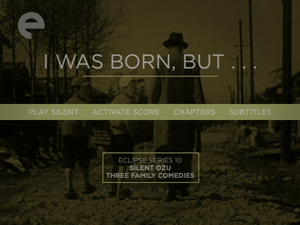
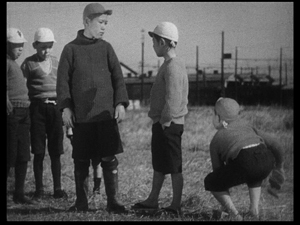
* I Was Born, But... (Umarete wa mita keredo) (90 min. - 1932): If I Was Born, But... reminds you once again of Good Morning, this time it's for a very good reason: the later film used this one as a jumping-off point. Written by Akira Fushimi from a story by James Maki, I Was Born, But... is the story of two grade-school-aged brothers (Hideo Sugawara and Tomio Aoki) who have newly moved to the suburbs, where they find the neighborhood kids to be rougher and more territorial than what they are used to. The comedy of the social interaction amongst the children is reminiscent of the Our Gang/Little Rascals shorts, with kids acting of one mind, running back and forth across the screen looking for trouble. An added element of Ozu's film, however, is the adult perspective and that childhood awareness that adults just don't get it. When the boys are discovered to have skipped school to avoid getting into a fight, dear ol' Dad (Tatsuo Saito again) tells them to just ignore the bullies and they will go away. The boys know this won't work, and so they have to invent other schemes to get out of harm's way. One always has to wonder how parents seem to forget so much of what the world is like! Ozu even shows the level of the father's selective blindness, using subtle cutting to show the parallels between the pecking order in the office and the classroom.
After the bully problem is dealt with, the boys become part of the gang, joining in bizarre death-and-resurrection pantomimes and eating sparrow's eggs for strength--the kind of wild ideas that kids invent based on overheard facts and half-truths and that make for great movie comedy. The children are fantastic performers, and I Was Born, But... comes alive every time they are on screen, borrowing its comedic approach straight from the playground. (I love Tomio Aoki--also called Tokkan Kozo--when he does a little side bit of comedy business straight from Tinsel Town.) Director of photography Hideo Mohara (who also doubled as the editor) lets his camera move when the kids do and lets it settle when they settle. Ozu's ensemble is comfortable and funny, coming off as natural performers rather than Hollywood caricatures.
Eventually, the games shift into a battle over whose dad is more important, and the final act of the film is concerned with the brothers discovering for the first time that their father is not everything they imagined him to be. To them, their father is the boss, and seeing him in a situation where he is actually the underling confuses them. After a violent row, their dad remembers how daunting and disappointing the intricacies of the social order can be for a child. The lesson he has to teach them about how to get along is remarkably similar to the one they learned in spite of his advice in regards to the bullies: tomorrow is another day, and another chance to take things head-on and make life better. It's as touching as it is funny, and it's right on the money.
Picture: I Was Born But... is definitely more than a step up from Tokyo Chorus. The image of the transfer (again, black-and-white and 1.33:1) is much more clear, with the surface scratches being far less prevalent. They are still there pretty regularly, but instead of being on the entire frame, are usually isolated to smaller areas. (In a couple of cases, they actually look like burn marks.) Once again, there are no bad cuts or splices, and there was no noticeable vibration.
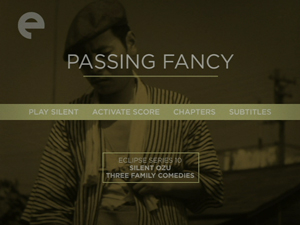
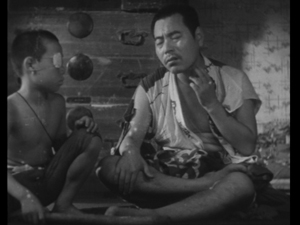
* Passing Fancy (Dekigokoro) (100 min. - 1933): A father-son relationship takes center stage yet again. This time, the father is happy-go-lucky Kihachi (Takeshi Sakamoto), a single dad who works in a brewery to give his son an education. The son, Tomio, is played by Tomio Aoki from I Was Born, But..., and he's already a couple steps ahead of dad in the smarts department. The two live simply in Tokyo, spending their nights at the restaurant down the street, palling around with dad's co-worker Jiro (Den Obinata). After an evening of entertainment, the two men meet Harue (Nabuko Fushimi), a young girl who is down on her luck. Jiro is suspicious of her, but Kihachi is immediately smitten. He gets her a job in the restaurant and sets to courting her. Only, she likes Jiro, who continues to think she's the wrong kind of woman. Kihachi, ever the loveable fool, is even enlisted by Harue's boss (Coko Iida) to try to change Jiro's mind.
Takeshi Sakamoto's sweetly comic performance dominates the picture. It's the sort of defining performance that makes an actor's career. A naturally genial screen presence, his smile sets Passing Fancy alight even as his character hits a rough patch. Broken-hearted over Harue, Kihachi drinks too much, staying away from work. When his son discovers what is happening, he confronts his father, and the two have it out. Unfortunately, their reconciliation has unforeseen consequences and Tomio gets sick. This event changes everyone's course, and it forces Kihachi to get his act together and show his true colors. The poverty-stricken man's stubborn pride gives Ozu yet another opportunity to question the honor of social mores and make a comment about community.
Shooting in the slums where Kihachi and Tomio rest their heads, Ozu and cinematographer Shojiro Sugimoto make the most of their cramped settings, often crowding their actors in the frame. The lives of the working class were seen as something to escape, and just like the parents in I Was Born, But..., Kihachi only wants to see his son better him. He is bemusedly aware that the boy has already done so, and this convention of the child being more responsible than the father is one that survives in movies and television to this day. Kihachi himself would also survive, with Sakamoto returning to the role several more times, including in Ozu's breakthrough A Story of Floating Weeds the following year. The director saw the potential in the character as a means of expression, reflecting many of the patriarch's in the filmmaker's own life. As such, that depth and charisma is already on display in Passing Fancy on both comedic and emotional levels.
Picture: This disc is essentially the middle ground in terms of quality. As with the others, it is full frame and black-and-white, and though it doesn't have the overall surface grime of Tokyo Chorus there are some scenes with the same amount of scratches. The bulk of the transfer is closer to I Was Born, But..., however. I also noted several times where the image froze for a second or two, presumably to fill in some gaps from missing frames, as these were usually lingering transition shots.
THE DVD
Sound:
All the movies have the same audio options: either a truly silent version or an optional mono score by Donald Soshin. You will be asked to "activate" the score from the main menu. Soshin's music fits the mood of each movie well without being overbearing or obtrusive. He writes for the piano, and he knows when to be softer (Tokyo Chorus) or more light-hearted (I Was Born, But...). His work is elegant and right on, servicing the material without advertising itself.

The intertitles on the films are in Japanese, with optional subtitle translations. These English titles also serve to translate important signs and other pieces of writing in the movies. I particularly liked the little boy in I Was Born, But... with the note on his back that read, "Upset Tummy, Do Not Feed Him Anything."
Extras:
As noted in the main review, the Eclipse series is intended as a no-frills alternative, so there are no bonus features on any of the DVDs. The five movies come housed in individual slimline cases that fit inside a cardboard slipcover. They can be slid out of the top or the bottom of the cover rather than the side. By way of supplemental material, each case has a short, informative essay about the film's place in the Ozu filmography printed on the inside front cover.
FINAL THOUGHTS:
Highly Recommended. Part of the fun of studying cinema history is to look back over a career and see the building blocks that allowed great directors to put together their signature style. Working in his second decade as a filmmaker and holding off transitioning to talkies until he got silent movies just right, the Japanese director Yasujiro Ozu found his most commonly traveled ground in three bittersweet, good-hearted family stories. Made from 1931 to 1933, the trio that makes up Silent Ozu: Three Family Comedies - Eclipse Series 10 serves as a welcome introduction to the great artist's work. Full of comedy and pathos, these wonderful stories of generational gaps and social struggles remind us that good drama and honest writing supercedes any technological advancement as the most essential tools in filmmaking. Another solid hit for Eclipse.
Jamie S. Rich is a novelist and comic book writer. He is best known for his collaborations with Joelle Jones, including the hardboiled crime comic book You Have Killed Me, the challenging romance 12 Reasons Why I Love Her, and the 2007 prose novel Have You Seen the Horizon Lately?, for which Jones did the cover. All three were published by Oni Press. His most recent projects include the futuristic romance A Boy and a Girl with Natalie Nourigat; Archer Coe and the Thousand Natural Shocks, a loopy crime tale drawn by Dan Christensen; and the horror miniseries Madame Frankenstein, a collaboration with Megan Levens. Follow Rich's blog at Confessions123.com.
|
| Popular Reviews |
| Sponsored Links |
|
|
| Sponsored Links |
|
|
| Release List | Reviews | Shop | Newsletter | Forum | DVD Giveaways | Blu-Ray | Advertise |
|
Copyright 2024 DVDTalk.com All Rights Reserved. Legal Info, Privacy Policy, Terms of Use,
Manage Preferences,
Your Privacy Choices | |||||||









